
Are you in search of the best multivendor eCommerce platforms? Or wondering what to look for when selecting a multivendor marketplace platform? If yes, then let’s go.
A multivendor marketplace is an eCommerce platform where multiple vendors can sell their products. So, there can be multiple shops run by different vendors in the same place.
If you want to create such a marketplace, then you need to select an eCommerce platform. But it must handle multiple vendors simultaneously and smoothly process all transactions.
For your ease, we’ve come up with a list of the best multivendor eCommerce platforms. It includes descriptions, pricing, pros/features, and cons of each of them. So, let’s begin!
What is a Multivendor Marketplace?
A multivendor marketplace is a large-scale eCommerce platform where multiple sellers can sell their products. It includes every basic eCommerce functionality. Plus, it supports necessary integrations to manage the overall marketplace operations.
Some of the famous giant multivendor eCommerce platforms are Amazon and eBay.

Not to mention, your customers can look for a wide range of products from various sellers or brands on your platform. Plus, they can easily buy the product that they’re looking for.
Relatively, a multivendor platform can be a little hard to manage. However, it’s less risky and financially beneficial than a single vendor eCommerce store. As you’ll earn a certain percentage of commission on the sales of your vendors on a multivendor marketplace.
To easily get started with the design, you can check out our list of the best multivendor WordPress themes.
How to Choose the Best Multivendor eCommerce Platforms for Marketplaces?
Before moving into the list of the best multivendor eCommerce platforms, there are a few things you must be aware of. And they are the points to consider when choosing from the best multivendor eCommerce platforms. So, let’s go!
- Website Builder: It’s best if the platform offers you an easy-to-use website builder. With that, you can easily create your marketplace without much technical knowledge.
- Customization Options: The software you select must contain helpful customization options. Also, it’s better if it allows your vendors to customize their own stores.
- Pricing and Payment Options: You should select a platform that falls under your budget. Further, you need to check if it supports the payment option you want to use.
- User Accounts and Products: Choose software that supports the required number of admin/user accounts in your marketplace. Also, the number of products to sell.
- Language Translation: Lastly, search if the platform supports multiple languages for translations. It’s important for reaching the marketplace to a global level.
Now, let’s move ahead and check out our list of the top multivendor eCommerce platforms.
17 Best Multivendor eCommerce Platforms for Marketplaces in 2025
Here’s the list of the 17 best multivendor eCommerce platforms for your marketplace. Go through every one of them on this list, and choose as per your needs.
1. Dokan (WooCommerce Extension)
Dokan is a dynamic multivendor marketplace solution with many features for customers and vendors. Every customer and vendor gets a rich front-end dashboard. And vendors can manage their inventory like sales, orders, discounts, etc.
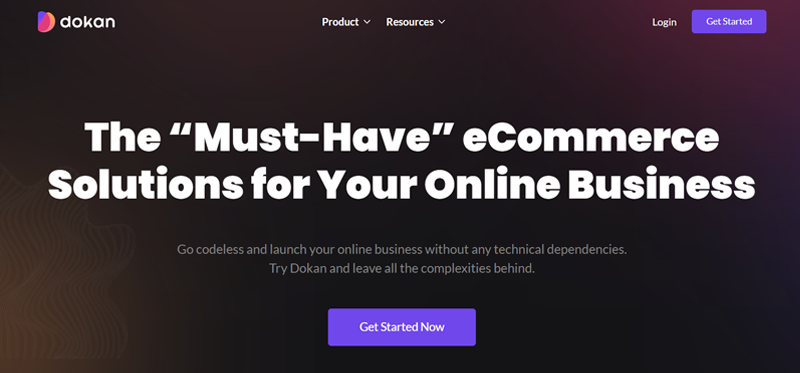
Moreover, it’s powered by WordPress and based on WooCommerce, the best eCommerce WordPress plugin. Because of that, it makes the user-interface simple and preferable for first-time users. Thus, 70,000+ active online marketplaces use Dokan among the 1.78+ million total downloads.
In addition, it allows you to create a marketplace of any type and to sell any kind of product. Whether it’s physical, service-based, or digital products.
Features/Pros:
- Vendors get to see the store sales report and overview of their store performance.
- Includes customer reviews function for gaining trust from users.
- As an admin, you can activate/deactivate the selling rights of the vendors.
- Support hundreds of popular payment gateways like Stripe, PayPal, etc.
- Multilingual-ready eCommerce platform for support of language translation.
- Offers premium Dokan modules like Ajax Live Search, Live Chat, Geolocation, etc.
Cons:
- Costly for startups.
- The setup process can be overwhelming for newcomers.
- May have compatibility issues with WordPress multisite system.
Pricing:
Dokan is available in both free and premium plans. You can download the free software from the plugin directory of WordPress.org. Then, upload it to your WordPress dashboard. Another way is to install it directly on the dashboard.
For the premium modules, you need to buy one of its pricing plans. They are:
- Starter: $149/year, 1-site license, 2 premium modules, all free features plus powerful reports, vendor management, admin coupon support, etc.
- Professional: $249/year, 3-sites license, 12 premium modules, all from the Starter plan, and other features like subscriptions, seller verification, etc.
- Business: $499/year, 5-sites license, 21 premium modules, all the Professional plan features including geolocation, auction, export/import, etc.
- Enterprise: $999/year, 20-site license, every Business plan feature plus other features like priority support, live chat support, etc.
In addition, Dokan also offers lifetime plans at the starting price of $708.
Want to create a marketplace using WooCommerce extensions like Dokan? Then, here’s a complete guide on how to make a marketplace website using WordPress. Make sure to check it out!
2. Multi Vendor Marketplace (Shopify Extension)
If you want to convert your Shopify eCommerce store into a marketplace, then here’s Multi Vendor Marketplace by Webkul. Using this platform, you can add unlimited sellers and products to your multivendor eCommerce marketplace.
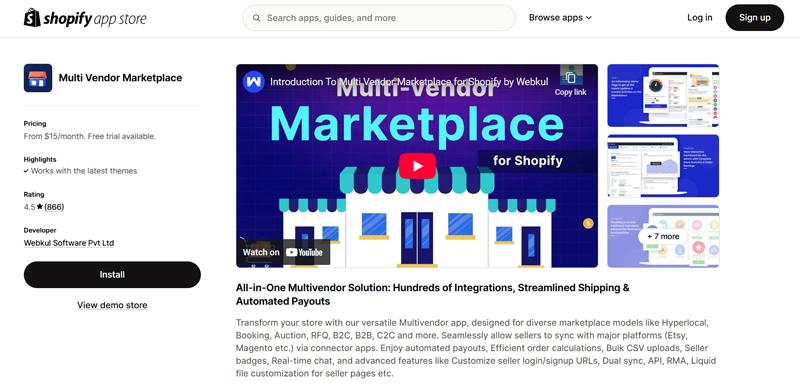
Moreover, it has the product sync function from which you can sync the products from other stores. Such as stores from WordPress, PrestaShop, or Magento.
Furthermore, as an admin, you can set global commissions for all the sellers. Also, you’re able to set separate commissions for individual sellers.
Features/Pros:
- Products or sellers can be added and bulk edited using a CSV file.
- Allow or deny sellers to have tax on their products.
- The reminder feature reminds the vendor of order fulfillment.
- Your sellers can have their own ‘Profile Page’ on the store.
- Customers can rate the seller on the profile page of those sellers.
- Multilingual and multi-location compatible.
Cons:
- Not the best in maintaining the SEO (Search Engine Optimization) level.
- It isn’t easily scalable.
- Lacking to provide a good CMS (Content Management System).
Pricing:
If you don’t have a Shopify eCommerce store, then the starting price is $25/mo for the basic plan. After that, you can get this multivendor marketplace app which is also premium. So, you need to purchase it by choosing one of the following pricing plans.
- Basic: $15/mo, 3 active sellers, custom fields for the seller profile page and product page, unlimited products, etc.
- Executive: $40/mo, 10 active sellers, and all the Basic plan features.
- Pro: $60/mo, unlimited sellers, Executive plan features, seller shipping, invoice, white-labeled, etc.
3. WCFM (WooCommerce Extension)
WCFM (Front-end Manager for WooCommerce) is one of the best multivendor eCommerce platforms available. It’s free software available at WordPress.org and comes with other premium modules.

Some free features include refund, store policies, inquiry manager, store review, store shipping, etc. Whereas from the paid modules, you’ll receive tons of extra features for your marketplace. Such as support tickets, store invoices, bulk & quick edits, etc.
Features/Pros:
- Supports integration to 40+ WordPress plugins and WooCommerce plugins like Elementor.
- Able to choose between 100+ payment gateways like PayPal, Skrill, etc.
- Comes with a free seller app for vendors to easily manage their stores.
- The Delivery extension comes with a free delivery app for shipping management.
- Offers free migration from other platforms to WCFM.
- Super clean and easy-to-use interface.
Cons:
- Many important modules need payment and which can be costly for startups.
- Not the best at providing customer support.
- Doesn’t include many free customization options.
Pricing:
WCFM is free software available in the plugin repository of WordPress.org. Or, you can also download it from its original website. Also, you can use another free module for offering free and premium subscriptions on your marketplace.
In addition, there are other premium modules present in WCFM. Some of them are:
- Ultimate: $59 to $299 pricing plans, features like more filters, customization options, and reports.
- Group & Staff: $49 to $249 pricing plans, features like the ability to categorize vendors, assign their capabilities, etc.
- Delivery: $39 to $149 pricing plans allowing your vendors to manage their delivery team.
- Analytics: $19 to $99 pricing plans that give analytics of store and products on the front-end.
Further, you can purchase all the add-ons with 1-year, 3-year, and lifetime plan options. And you get to use them for up to 2 or unlimited sites. The pricing range is $224 to $1,044.
4. Product Vendors (WooCommerce Extension)
Want to convert your WooCommerce store into a multivendor marketplace? Then, you must use Product Vendors.
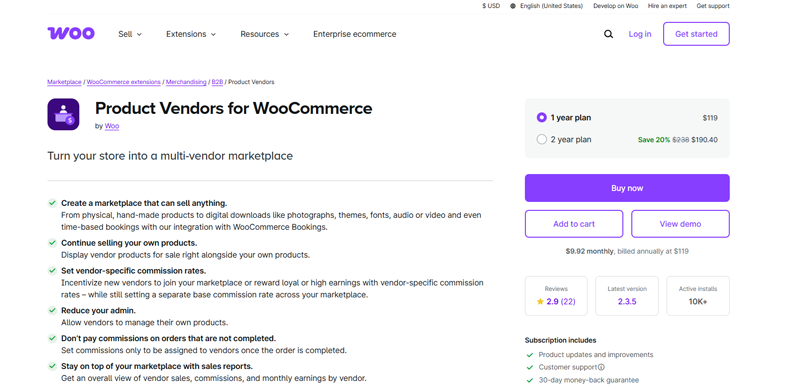
It’s the official WooCommerce extension working as one of the best multivendor eCommerce platforms. Using it, you’ll get to build a complete marketplace with multiple products, vendors, and payout settings.
Not to mention, you’re able to sell your own products alongside your vendors. And the items can be physical, hand-made to digital downloads.
Features/Pros:
- Allows your vendors to manage their own products.
- Gives reports to view and analyze the vendor sales, commissions, and earnings.
- Ability to use PayPal Payout settings to delay commission payments in case of returns on physical products.
- Integrates WooCommerce Bookings allowing vendors to sell time-based bookings.
- You can approve/deny the vendor products before they get added to the store.
Cons:
- Doesn’t have front-end control for many functions.
- It can be a little difficult for users to work with the WordPress dashboard for performing their roles.
Pricing:
Product Vendors is a premium WooCommerce extension. So, you need to buy it from the original site of WooCommerce.
The price of this multivendor eCommerce platform is $119 for 1 year plan, that’s billed annually. It also comes with 1-year extension updates and 1-year support. Meanwhile, you can also purchase 2 year plan at $190.40.
Here’s an article on the comparison between WooCommerce vs Shopify.
5. Multi Vendor Marketplace by Webkul (BigCommerce Extension)
Multi Vendor Marketplace by Webkul for BigCommerce is another platform to create a full-fledged multivendor marketplace. It comes with an intuitive control panel where the admin can add products, manage orders and sales, take commissions, etc.
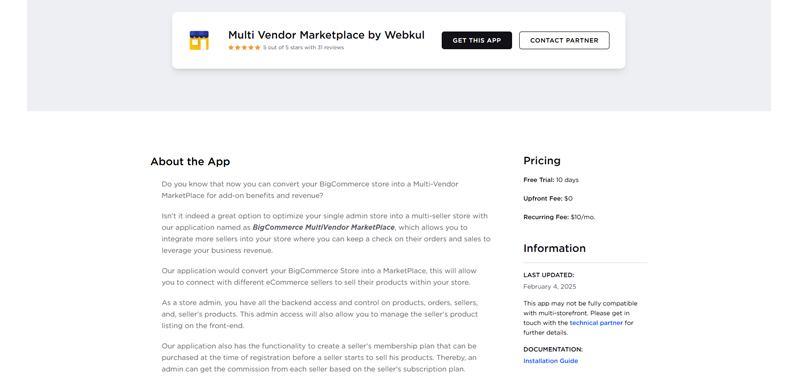
Moreover, you can also add multiple sellers, make the seller an admin, enable/disable the seller’s admin access, etc. Not only that, you can sync the products from your BigCommerce store to your marketplace with ease. Also, you get to assign the products to any sellers.
Features/Pros:
- You can make several subscription plans for your sellers.
- Every vendor can manage their own products and panel settings from the seller panel.
- Easy product management as you can manage multiple products at the same time.
- Able to create a hassle-free payout process for the seller.
- Choose to either auto-approve the vendor products or do it manually.
Cons:
- Can do better in terms of customer support.
- Lacks variation in multivendor themes available.
Pricing:
To get the BigCommerce eCommerce platform, you need to buy it at the starting price of $29/mo. Then, you can use this multivendor extension for 10 days as a free trial for your marketplace. However, as a premium software, you need to pay $10/mo after that.
To know more about this site builder, check articles on Shopify vs BigCommerce and BigCommerce vs WooCommerce.
6. Multi Vendor Marketplace (Wix Extension)
Want to convert your Wix eCommerce site to a multivendor marketplace? Or looking forward to using Wix builder for creating a marketplace? In that case, here’s an add-on.
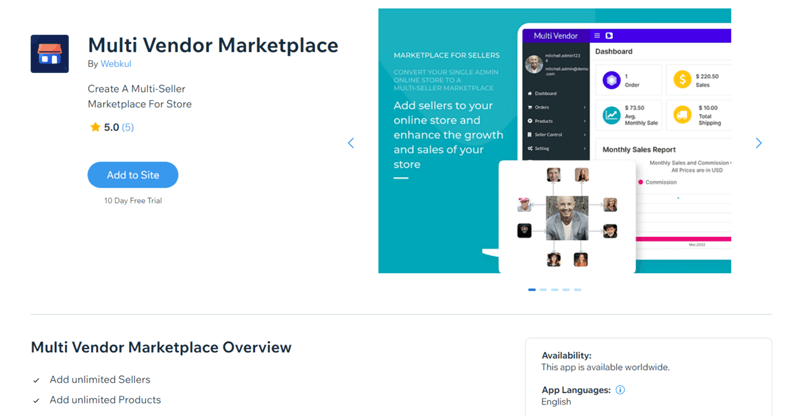
Multi Vendor Marketplace is a Wix extension that can build a marketplace from your store. It allows the addition of unlimited sellers and products.
Moreover, you can assign an existing product to the seller. This makes it ideal for those who want to convert their store into a multivendor platform.
Features/Pros:
- Gives a user-friendly dashboard to access the products, sellers, orders, etc.
- You can create seller plans and set a commission to receive from the sellers.
- Admin approves the registration request that the seller sends.
- The accounting option helps to manage transactions between the admin and seller.
- Offers a 10-day free trial to try and test the platform.
Cons:
- Lacks good customer support.
- Not the best for the large-scale marketplaces.
Pricing:
Wix is a freemium site builder, so you can start with the free version. Or directly purchase one of the premium plans as per your requirement. The price ranges from $17 to $35/mo.
Now, let’s see the case for the multivendor marketplace extension. After the 10-day free trial, you need to pay as per the premium pricing plans of this add-on. They are:
- Basic Plan: $9/mo billed yearly, $10/mo billed monthly, allows 10 sellers, 1000 products, and support via tickets.
- Business Plan: $25/mo billed yearly, $30/mo billed monthly, allows 50 sellers, 2000 products, and support via tickets and live chat.
- Pro Plan: $36/mo billed yearly, $45/mo billed monthly, allows unlimited sellers, unlimited products, and support via live chat and meetings.
Here’s a comparative guide on Wix vs Shopify that you may find helpful.
7. X-Cart
Another scalable multivendor marketplace platform that offers unlimited growth is X-Cart. This solution builds your dream marketplace with hassle-free management. Your vendors have full access to manage their products. While you can control or monitor the entire store.
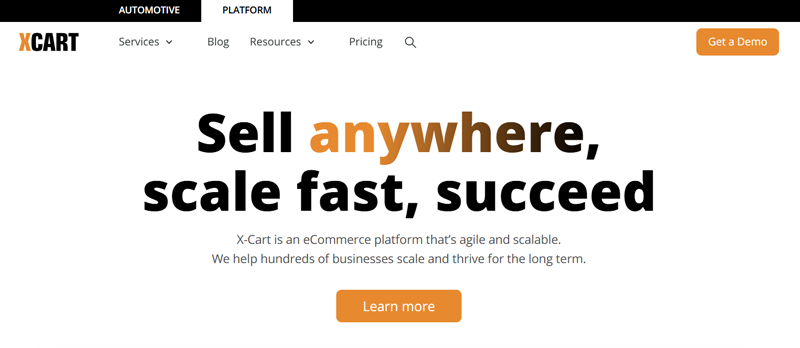
Moreover, you can allow the product shipment to occur from a single warehouse. Or approve every vendor to have their separate shop. This lets them manage the orders and set their own shipment information.
Additionally, accounting in X-Cart is also simple. The platform can automatically handle the vendor payouts while still allowing you to set the commission rates. If not, then you can go with the manual process as well.
Features/Pros:
- Customers can search for the products by brand on your marketplace.
- Includes chat features for buyers and sellers to communicate about the products.
- Gives insights into your business, customers, preferable products, etc.
- Customers can rate and review various topics like product quality, support, etc.
- Offers easy-to-use and helpful shipping calculators and sales tax automation tools.
Cons:
- Requires better store design templates.
- Needs improvement on the compatibility on mobile devices.
- Relatively expensive cost.
Pricing:
The multivendor solution in X-Cart is available on the premium Marketplace plan. And the starting cost of it is $249/mo. Some of the features you get include unlimited vendors, a product catalog for every vendor, etc.
8. CS-Cart
CS-Cart is one of the top-rated eCommerce platforms best for making a seller-friendly multivendor marketplace. It includes built-in designing tools with 9 out-of-the-box styles. Using one of those styles, you can create your own unique layout and design for the marketplace.
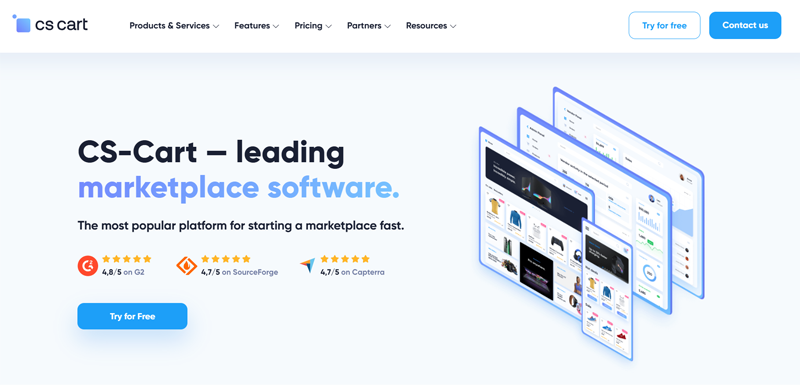
On top of that, it contains a layout manager that allows you to drag and drop the blocks. Overall, you can build the layout and customize the marketplace with just a few clicks.
Not to mention, your vendors will have a standalone micro-store on your marketplace. It includes the store description, products, filters, and categories for their goods. And they can have their own design on their stores.
Features/Pros:
- You can approve the vendor products before it appears on your marketplace.
- The vendor geolocation feature is best for selling in a large geographical area.
- Allows employee registration, and you can set their access levels on the admin panel.
- Integrates with Google Analytics that gives insights about your site traffic.
- You can get a native mobile app with a responsive design for more customer reach.
Cons:
- Can delay their customer service due to time zone differences.
- Needs improvement in the language translation.
- Not the best when it comes to its attractive storefront themes.
Pricing:
This premium marketplace software allows you to add unlimited products when using its plans. So, choose one of the following plans that meet your needs.
- Standard: $55/month billed annually, 45 days of customer care, lifetime free bug and security fixes, separate vendor panel, etc.
- Plus: $110 per month billed annually, 90 days of customer care, Standard plan features, 180 days of free upgrades, design editors for vendors, and more.
- Ultimate: $275 per month billed annually, 180 days of customer care, Plus plan features, lifetime free upgrades, multiple storefronts, etc.
- Unlim: All the Ultimate plan features, offers services till the subscription is active, and needs to contact the CS-Cart team for purchase.
9. Multi Vendor Marketplace (Magento Extension)
To convert your Magento eCommerce store into a multivendor marketplace, you need to use Multi Vendor Marketplace. It’s a Magento extension that offers lots of features for you, your vendors, and your customers in the marketplace.
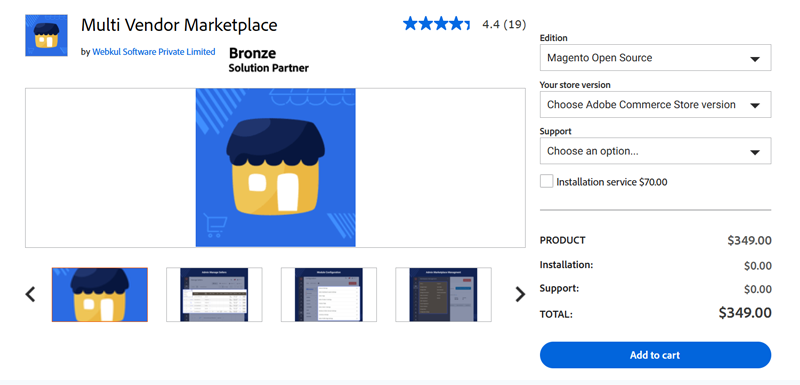
For the overall growth, you and your vendors can use Google Analytics. With that, you get to analyze and record the data of their stores. Consequently, it helps to understand your customers and their needs that can be fulfilled from your marketplace.
Features/Pros:
- You can create customized email notification templates.
- Choose and customize from 3 different layouts for the marketplace landing page.
- You can decide to auto-approve orders, hide seller-buyer information, etc.
- Admin can set the SKU prefix to differentiate the seller’s products.
- Vendors can view all their transactions. Like earnings, sales, commission, etc.
- Customers can compare the price of the products of multiple vendors.
- Users can view the location of the vendor on the vendors’ profile page.
Cons:
- Comparatively, expensive in terms of cost.
- Not that great in customer support.
- It isn’t easy to use for beginners due to the high learning curve.
Pricing:
The premium Magento eCommerce platform can be expensive up to $2,000. While referring to this multivendor marketplace platform for Magento, it has the following editions:
- Open Source (CE): $349
- Commerce on Prem (EE): $698
- Commerce on Cloud (ECE): $698
Plus, the installation service takes an additional $140. Similarly, the support options are also available in 2 plans, they are:
- 6-month Service Agreement: $280
- 12-month Service Agreement: $350
10. OpenCart Multivendor Marketplace (OpenCart Extension)
OpenCart Multivendor Marketplace is an online marketplace extension for OpenCart stores. This module allows you to multiply or extend your business to the next level.
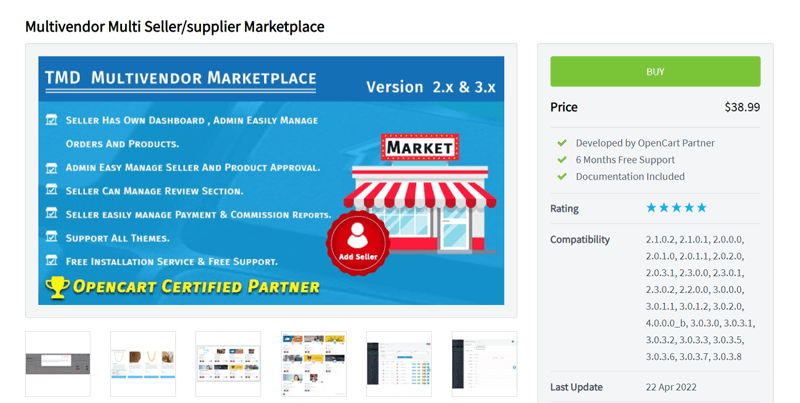
Moreover, it’s integrated with an email system that sends an email to vendors after a customer purchases their products. Plus, you can customize the email message as necessary.
In addition, every user gets their own dashboard. And vendors can manage the downloads, products, reviews, etc. from their dashboard. Also, they can change their profile information.
Features/Pros:
- You can assign a fixed or percentage commission level to every vendor.
- Admin has the right to approve or deny a vendor registration and their products.
- You can track every order of each vendor, income, and buyer from the admin panel.
- Supports hundreds of languages for user interaction.
- Accepts unlimited vendors, their vendor dashboards, and the number of products.
- The Seller Buyer Chat System enables direct communication between both users.
Cons:
- You need to find a hosting platform and get a domain yourself.
- The mobile app is available only for Android.
Pricing:
OpenCart is a free eCommerce platform that you can download from its website. However, you need to purchase a hosting solution for your website.
This premium marketplace module of OpenCart costs $38.99. It comes with 6 months of free support. Also, you’ll get the complete documentation for better support.
11. Multi Vendor Marketplace Module (PrestaShop Extension)
Multi Vendor Marketplace Module by Knowband is a PrestaShop extension that converts your shop into a marketplace. This marketplace module comes with an easy-to-use admin interface and a seller-friendly interface.

Moreover, the admin can manage the sellers, seller’s products, reviews, testimonials, customer feedback, and more. Whereas, after seller registration, they can access their shop profile, list products, manage orders, etc.
Features/Pros:
- Able to charge the commission according to fixed commission or category-wise.
- Charge membership subscription fee on a monthly, quarterly, half-yearly, or yearly basis.
- Gives automated email notifications for managing the operations of the marketplace.
- Sellers can track their sales, integrate shipping methods, check earnings, and more.
- Users can view the seller profile, shipping information, privacy, and return policies.
Cons:
- Not that great in terms of customer support.
- It isn’t the best for providing security features.
Pricing:
PrestaShop eCommerce is available for free. But you need to look for the hosting service separately.
While for this multivendor marketplace module, the purchase price is 139,99€ for 1 year. After that, it costs 3,33€ per month to get the business care.
12. MultiVendorX
MultiVendorX is a WordPress plugin that transforms your WooCommerce store into a multivendor marketplace.
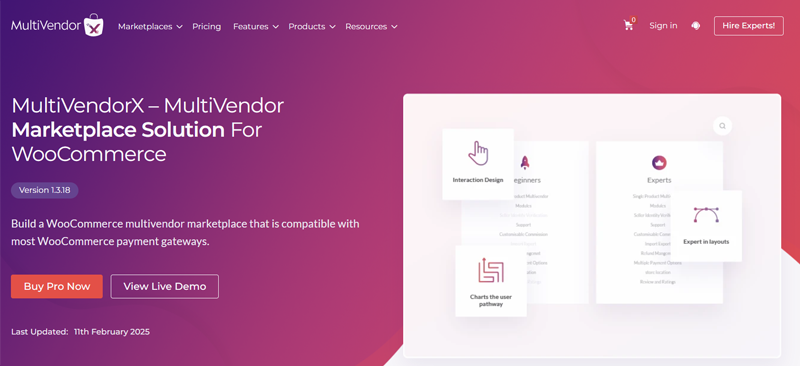
It’s designed for entrepreneurs aiming to create platforms similar to Amazon or eBay without coding knowledge. With MultiVendorX, vendors can manage their products, orders, and sales through a user-friendly dashboard, while administrators oversee the entire marketplace efficiently.
Features/Pros:
- Supports various payment methods, including PayPal and Stripe, ensuring smooth transactions.
- Enables multiple vendors to sell the same product, fostering competition.
- Breaks language and currency barriers, allowing global reach.
- Offers tools for verifying vendor identities, enhancing trust and security.
- Allows setting different commission rates per vendor, product, or category.
Cons:
- New users might need time to familiarize themselves with all features.
- Some functionalities are only available in the paid version.
- Some users have reported delays in customer support responses.
Pricing:
MultiVendorX is a freemium platform. The free is easily available at the the WordPress.org. Meanwhile, the premium platform is available in 2 distinct pricing plans. They are:
- Starter: $299/year. Includes 1 site, 50+ modules, along with 1 year of support and updates.
- Growth: $399/year. Includes 3 sites, 50+ modules, along with 1 year of support and updates.
- Agency: $499/year. Includes 10 sites, 50+ modules, along with 1 year of support and updates.
Looking for an eCommerce platform to quickly build your minimal marketplace? Then, choose Sharetribe.
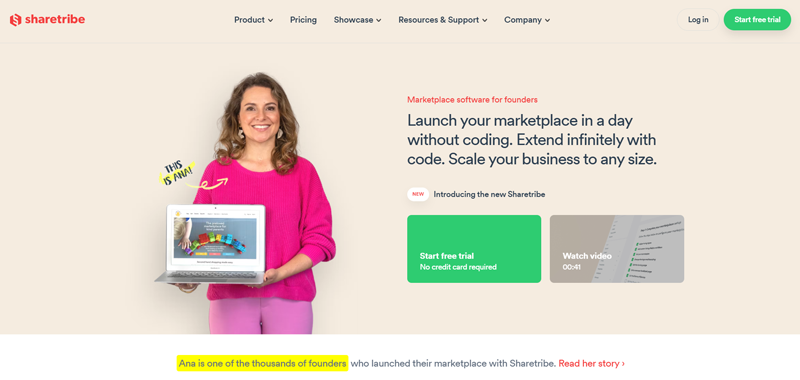
Sharetribe is a popular solution that comes with 2 services. And they are Sharetribe Go and Sharetribe Flex. If you want to fastly make a minimal marketplace, then choose Go. While for a next-level large-scale marketplace, select Flex.
So, you can use this platform to meet any needs. It doesn’t matter if you are starting a niche peer-to-peer platform or a global B2B business. Best of all, you don’t need to do coding at all. It has enough features and options to set up and run your marketplace.
Here are the pros and cons of Sharetribe Go.
Features/Pros:
- Vendors can state their listing availability per day, night, or hour. While customers can view them on a listing calendar.
- Advanced filtering and categorization tools result in easy searchability.
- Accepts payments from over 200 countries and in 25 currencies.
- Users can sign up to your marketplace via Facebook, Linkedin, or Google accounts.
- Easily move your Sharetribe Go plan to Sharetribe Flex as your business grows.
Cons:
- Limitation in marketing features.
- It can improve on its customization options.
Pricing:
Sharetribe Go is available for a 14-day free trial. And the premium pricing plans are:
- Build: $39/month. Includes a fully-featured no-code marketplace builder (Test mode) and a developer platform (Dev mode).
- Lite: $99/month (billed yearly). Includes everything in the Build plan plus a live marketplace, a mysharetribe.com domain, outgoing email, and 50 free transactions per month.
- Pro: $199/month (billed yearly). Includes everything in Lite plus a custom domain, custom outgoing email, third-party integrations, 250 free transactions per month, etc.
- Extend: $299/month (billed yearly). Includes everything in Pro plus customizable live marketplace code, API access, support for mobile app development, and 500 free transactions per month.
14. Kreezalid
Kreezalid is one of the best eCommerce platforms to easily create and grow a custom online multivendor marketplace. It allows you to use your own design and customization for your marketplace. Moreover, if you can’t set it up yourself, then the Kreezalid team will make it for you.
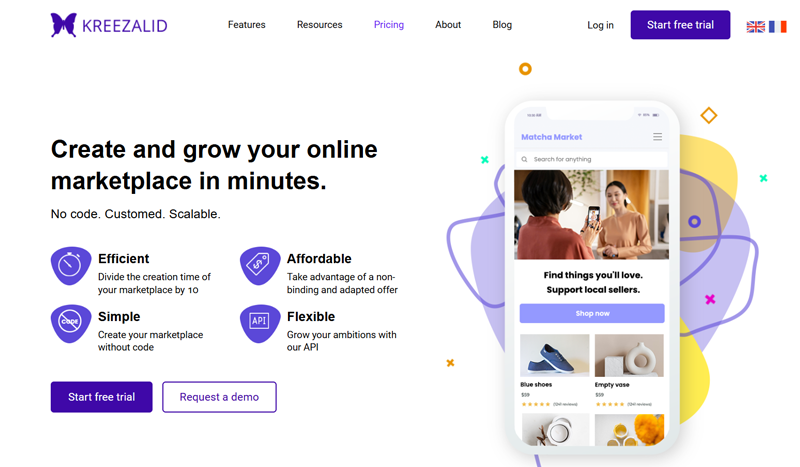
Further, it comes with a listing builder that allows vendors to easily make their listings. Also, you can set up various listing creation forms with custom fields for every listing category.
Not to mention, you can manage and control the entire catalog. For your ease, Kreezalid offers a multi-criteria search engine and filtering tools.
Features/Pros:
- Gives automated transactional email templates that you can customize.
- Vendors can track their own sales on their dashboards.
- Follows best SEO practices by which potential users can find your marketplace.
- Social media integration enables you to easily share your content on social media.
- Comes with a theme editor to choose a theme and customize your entire marketplace.
Cons:
- The learning curve is a little steep at first.
- Needs improvement on its support options like documentation.
Pricing:
Kreezalid is a premium platform that comes at the following pricing costs:
- Starter: €249 per month. Includes 2 staff accounts, up to 100 user accounts, up to 1000 listings, theme editor, user groups, email and live chat support.
- Scale: €299 per month. Includes 3 staff accounts, unlimited user accounts, unlimited listings, theme editor, user groups, email and live chat support, custom transactional emails, and more.
- Advanced: €379 per month. Includes 10 staff accounts, unlimited user accounts, unlimited listings, theme editor, user groups, custom transactional emails, vendor statistics, admin reports, and more.
15. Yo!Kart
An agile multivendor eCommerce software that can build customizable marketplaces for startups and large organizations is Yo!Kart. It not only helps you to enter new markets but also guides you for the growth of your multivendor business.
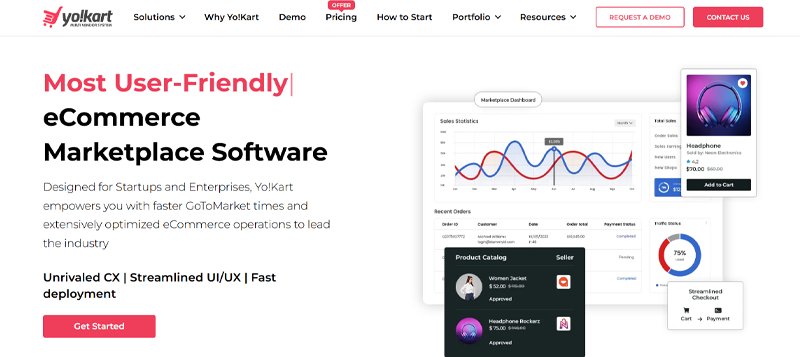
In the case of user management, it enables you to organize your users and perform actions in easy steps. Similarly, you can streamline your customer orders from order placement to delivery with real-time analytics.
Not to mention, Yo!Kart can perform real-time currency conversion. So, buyers can transact in their regional currency. On top of that, the platform can also translate over 70 languages automatically for global reach.
Features/Pros:
- Create custom discount coupons for the promotion of sales.
- Buyers can add items from multiple vendors to a single cart and check out the order.
- Integration to ShipStation can automate all your shipping processes.
- Pre-integrated with 20+ payment methods and allows integration to even more.
- Users can add products to their favorite or wishlist according to your setup.
- Vendors can show their featured products on the homepage of your marketplace.
Cons:
- Doesn’t have a clear strategy on plan upgrade.
- Getting high-security features is costlier.
- Not as flexible as other platforms.
Pricing:
Yo!Kart gives scalable and compelling packages to choose from as per your needs. So, let’s have a look at these premium prices:
- GoQuick: $499, self-hosted, lifetime license, all standard features plus tech support for 6 months and Whitelabel web solution.
- GoQuick Boost: $1249, all GoQuick features and others like 12 months of tech support, marketing services, etc.
- GoCustom: $6249, all GoQuick Boost features plus 9 custom design pages, payment options, and lots more.
- GoCustom Prime: Cost based on your business requirement, all GoCustom features, custom feature development, etc.
16. ZielCommerce
ZielCommerce eCommerce platform offers a powerful enterprise-grade solution ‘ZielMart’ for multivendor marketplaces. Further, it’s crafted to build a marketplace using any business model. Whether it’s B2C (Business-to-Customer), C2C (Customer-to-Customer), or B2B (Business-to-Business).
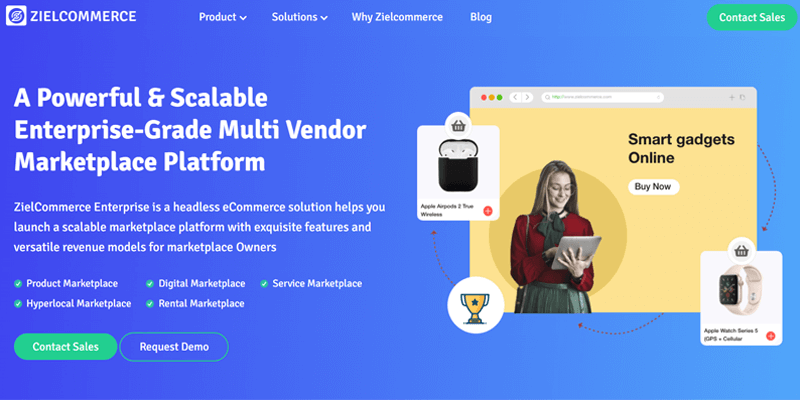
Moreover, it comes with tons of marketing and promotional features. Such as options for coupons and discounts, automated email marketing, and social media marketing integration. Plus, it’s built SEO-friendly and gives a featured blogging suite for more visibility.
Features/Pros:
- Offers a feature-rich mobile app for a seamless shopping experience using mobile.
- Includes smart automation features to boost the performance and speed of the site.
- Keep percentage-wise or fixed commission rules and then tax rules for products.
- Vendors can keep banner ads in the allotted space on the home page.
- Buyers can compare the price of products by various vendors on your marketplace.
Cons:
- Need to request a free demo and don’t include a free trial option.
- Offers the lifetime access plan only. And you need to contact the sales to know the price.
Pricing:
This premium platform doesn’t have any free trial option. Although, you can request a free demo for better understanding.
In addition, you’ll get all the ZielCommerce features with the marketplace solution from a one-time payment. Thus, it gives you a lifetime license of the platform. To know about its price, you need to contact the sales team.
17. Arcadier
The last one on the list is another flexible SaaS (Software as a Service) marketplace software, Arcadier. Using this platform, you’ll get great features for speed, customization, and support for your multivendor marketplace.
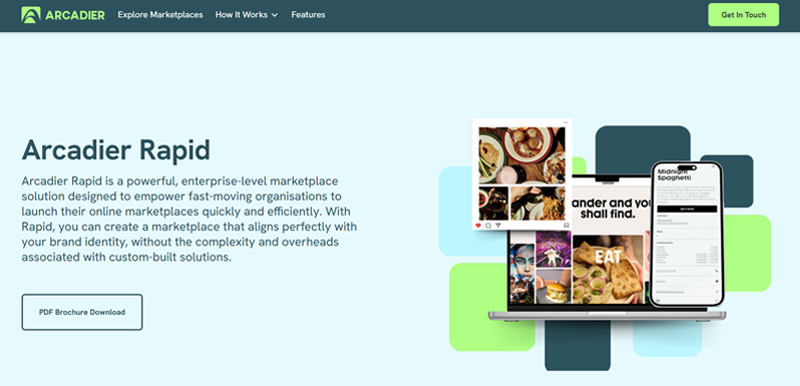
Additionally, it supports numerous types of business models for your marketplace. So, you can use a B2C or B2B model for your goods, rental, or service marketplace.
Further, there’s a wide variety of modern design templates in Arcadier. By choosing one of them, you can set up a stunning marketplace with ease.
Features/Pros:
- Powerful customization tools like homepage layout editor, custom code editor, etc.
- Includes multiple plugins that add new functionalities or improve the customization.
- Keep your marketplace private to approve or invite sellers, buyers, or both.
- Users can search using keywords, dates, etc. Also, it includes filter and sort options.
- Buyers can request a negotiated price, and sellers can respond with special offers.
Cons:
- It can improve its customization options.
- Prices may increase if you need to use an API for more features.
Pricing:
Arcadier does not publicly disclose its pricing details on its website.
However, they offer different plans tailored to various business needs, including solutions for startups, small businesses, and large enterprises. Pricing is typically based on factors such as marketplace size, required features, API access, and hosting infrastructure.
For accurate pricing details and a customized quote, it is recommended to contact Arcadier directly through their website. Their team can provide specific information based on your business requirements and marketplace goals.
Frequently Asked Questions on Multivendor eCommerce Platforms for Marketplaces
1. What is a Multivendor eCommerce Platform?
A multivendor eCommerce platform is an online marketplace that allows multiple vendors to sell their products or services through a single website. It provides a centralized system for managing inventory, orders, payments, and commissions.
2. How Does a Multivendor Marketplace Work?
A marketplace owner (admin) sets up the platform, allowing vendors to register, list products, and sell to customers. The platform handles order management, payments, and commissions, often taking a percentage of each sale.
3. What are Some Popular Multivendor eCommerce Platforms?
Some popular multivendor eCommerce platforms include Dokan, Multi Vendor Marketplace, WCFM, Product Vendors, and more.
4. What are the Benefits of a Multivendor Marketplace?
Multivendor marketplaces allow businesses to scale without holding inventory, as vendors manage their own stock. The admin earns through commissions on each sale, and customers enjoy a wide variety of products in one place, enhancing the shopping experience.
5. How Do Vendors Register on a Multivendor Platform?
Vendors usually sign up through a registration form, providing business details. Once approved by the admin, they get access to a dashboard where they can add products, manage orders, and track their earnings.
6. How Does Payment Work in a Multivendor Marketplace?
Payments are typically handled through integrated gateways like PayPal, Stripe, or bank transfers. Some marketplaces use direct payments to the admin, who then distributes earnings, while others offer automated split payments to vendors.
7. How Does the Commission System Work?
Admins earn revenue by charging vendors a commission on sales. This can be a fixed percentage per transaction, a monthly subscription fee, or a tiered commission model where vendors with higher sales pay lower fees.
You might love exploring our article on how to make marketplace using WordPress.
Conclusion
And we’ve reached the end of this article. We hope you were able to choose from the best multivendor eCommerce platforms for your marketplace.
Among these multivendor eCommerce platforms, we recommend using Dokan. It’s a popular platform serving as a WooCommerce extension, another popular eCommerce platform. Also, you can choose another platform from this list as per your needs.
If you’ve any queries related to this, then you can simply comment below. We’ll be happy to help you.
In return, we’ll be pleased if you can check some of our latest articles on the best WooCommerce block plugins and the ProductX review.
Lastly, we want you to follow us on Facebook and X for more future updates.


